The Monero Moon (Issue 72)
The Monero Moon is a curated newsletter covering all the latest news within Monero (XMR). We are driven by a compelling need to champion both freedom and financial privacy!
Table of Contents:
Development, Releases, and Technology
General News
Events
Exchanges and Merchants
Community Crowdfunding
Trading and Speculation
Network Metrics
Entertainment
Development, Releases, and Technology
The official Monero v0.18.3.4 'Fluorine Fermi' has been tagged, with release binaries expected soon. The official Monero v0.18.3.4 'Fluorine Fermi' is a version update of the Monero software, including both command-line (CLI) and graphical (GUI) interfaces, with new features, fixes, and improvements. Key updates include added support for Ledger Flex, fixes for ZMQ Tx pruning and duplicate transactions in the fluff queue, and enforced Tx unlock_time rules in the CLI. The GUI sees pruning enabled by default, updates to p2pool v4.1, new Trezor Safe 5 integration, and support for @ in OpenAlias domains. Contributors are encouraged to share their deterministic build results via pull requests to the monero-project/gitian.sigs repository.
Cypher Stack has published an analysis that consolidates years of research and knowledge on Monero's security. The report reviews the history of Monero's privacy and safety measures, highlighting various techniques adversaries have used to challenge these properties. It also discusses how many of these methods have been mitigated through protocol and implementation changes, while noting that some attack surfaces still pose concerns. The analysis is particularly relevant as the Monero community explores new protocol research aimed at enhancing privacy goals. You can find the report here.
woodser has released Haveno version 1.0.10, introducing support for Tor’s Proof-of-Work (PoW) DoS mitigation feature for seed nodes, along with various improvements and bug fixes. Key updates include throttling connection log spam, fixing issues with application launch and wallet syncing, resolving pending offer problems, supporting re-opening disputes if payouts fail, and enhancing UI elements like dark mode and autocomplete for payment methods. The release also includes numerous bug fixes and stability improvements. Notably, bvcxza and boldsuck made their first contributions in this release.
ofrnxmr’s CCS proposal to develop and refine BasicSwapDEX into production-quality software within approximately one year has been fully funded by two donors. BasicSwapDEX, an atomic swap service that allows Monero swaps with non-Bitcoin coins like Litecoin, has been in beta. The funded proposal outlines milestones, including frontend and backend development, GUI updates, and preparation for the 1.0 release. The project includes extensive work on improving UI/UX, adding new functionalities, and ensuring long-term maintenance and support.
Justin Berman has published his final progress report for his full-time 2024 Monero and Seraphis development CCS proposal. The update details over 545 hours of work, including a PR that covers all promised deliverables. Key contributions include the integration of fcmp++ with Rust FFI, enhancements to Monero’s C++ code, and critical algorithm and structural changes to support the tree migration and synchronization in the Monero network.
woodser has released v0.10.0 of the monero-ts library, featuring significant updates and improvements. The Monero TypeScript (monero-ts) library is a tool for building Monero applications, enabling client-side wallets and daemon interactions using RPC and WebAssembly, and supporting features like multisig, view-only, and offline wallets. Key changes include updating emscripten to 3.1.26, using a mutex for wallet operations, switching to async file system operations, and replacing html5-fs with memfs. Additionally, promises now return undefined when appropriate, and initializing a keys wallet with a server connection is disallowed. NorrinRadd and mainnet-pat also contributed to this release.
tobtoht has released v2.6.8 of Feather Wallet, featuring various fixes, updates, and improvements. Feather Wallet is a free, open-source Monero desktop wallet designed for Linux, Tails, Windows, and macOS, offering an easy-to-use interface with advanced features suitable for both beginners and experienced users. Notable changes include updating Monero to v0.18.3.4, Qt to 6.7.2, and Tor to 0.4.8.12. The release also removes Reddit and LocalMonero plugins, re-enables Trezor bridge transport, fixes issues with the transaction pool viewer and settings, and enforces stricter file naming rules in the wizard.
Cake Labs has pre-released Cake Wallet v4.19.4 and Monero.com v1.16.4, featuring improvements in Monero synchronization, wallet backups, error handling, UI enhancements, and various bug fixes.
MrCyjaneK has released the latest version of Unnamed Wallet, v1.0.0-RC62. This update addresses an important fix for macOS builds and includes various assets for both Monero and Wownero users. The release provides APKs for Android, RPM packages for Linux, and zip files for Windows, catering to a broad range of platforms.
SChernykh has released P2Pool v4.1, introducing new features and various bug fixes. P2Pool is a decentralized mining pool for Monero that allows miners to collaborate in finding blocks without relying on a central server, distributing rewards directly from the blockchain. Key updates include SSL/TLS support for Stratum connections, new command line parameters for certificates, and improved detection of HTTP requests to the Stratum port. Bug fixes address issues like random startup failures on Windows, occasional deadlocks during exit with merge mining active, and unnecessary file writes in the P2Pool API. Internal dependencies have also been updated to the latest versions. P2Pool will hardfork to new consensus rules on October 12th, 2024, at 20:00 UTC, enabling merge mining; users must update to P2Pool v4.0 or newer before this date (note: the Monero blockchain itself will not hardfork).
XMRig and XMRig Proxy v6.22.0 have been released, featuring various fixes and improvements. XMRig is a high-performance Monero miner that supports various algorithms, while XMRig Proxy is a companion tool that allows multiple miners to connect through a central server, optimizing mining operations and managing connections more efficiently. Notable updates include support for the Yada (rx/yada) algorithm, a fix for the --background option on Unix systems, a potential fix for corrupted API output in rare cases, and the removal of the rx/keva algorithm.
Rucknium released Monero Stressnet Node version 251.18.3.3.0, which introduced a new hardfork from testnet at height 2557352, occurring around August 10, 2024. This release is incompatible with previous versions, requiring users to either run a new node alongside the old one with separate blockchain directories and ports, or shut down the old node and start fresh with the new version. Key updates included raising the default outgoing connections limit, adding seed nodes for the new stressnet, and improving synchronization processes. nahuhh also made their first contribution in this release.
spackleXMR reported that the Monero Stressnet testing has been successful, prompting plans to extend the network for at least another two months. Testing has led to significant improvements, including better block recognition during abnormal operations, enhanced daemon performance under heavy transaction volumes, and discussions on synchronization design. Ongoing participation is encouraged, with discussions held in the #monero-stressnet IRC channel. Special thanks go to Rucknium and all participants for their crucial contributions.
FiatDemise has launched XMRChat, a Monero-based superchats platform for content creators. XMRChat aims to make Monero the go-to tipping currency for live-streaming, offering features like no platform fees, direct transfers to streamer wallets, privacy with no accounts or personal details required, and instant transactions. The platform also includes integrations like an XMRChat Twitch bot for tip notifications. The project, led by FiatDemise with contributions from Doug and saeed8ab, began earlier this year.
valldrac has submitted a second progress report for their CCS proposal to develop a Monero Wallet SDK for Android, successfully completing Milestone 2. The update includes the implementation of integrity checks to mitigate the risk of malicious remote nodes injecting forged blocks during wallet refresh. The full progress report is available on GitLab, and a demo APK can be downloaded from GitHub.
DiosDelRayo has posted a third progress report for their CCS proposal to take over and finish the Monero Signer (currently rebranding to XmrSigner) project, completing Milestone 3. XmrSigner is a fork of the SeedSigner project, adapted for Monero, providing a DIY hardware wallet solution that remains completely offline, using a Raspberry Pi Zero to sign transactions securely via QR codes without ever connecting to the internet. While the project is functional, it is not yet production-ready, with the current development image based on an older Raspberry Pi OS. DiosDelRayo plans to continue to Milestone 4, focusing on transforming the XmrSigner Companion code for broader compatibility with the Monero GUI. The milestone included final cleanup of tools, scripts, and documentation.
jeffro256 has posted the July 2024 progress report for their Monero development CCS proposal. This month, the focus was on drafting the Carrot document, detailing the addressing protocol, FCMP++ requirements, balance recovery steps, and security properties. Additionally, time was spent testing and refining the Jamtis-RCT library. The report includes ongoing work on the jamtis_rct branch and the Carrot document.
0xFFFC has submitted a CCS proposal to continue full-time Monero development for three months, focusing primarily on performance improvement opportunities. The proposal includes tasks such as dynamic block-sync-size (BSS), bandwidth-efficient transaction propagation, root cause analysis for out-of-memory issues, and performance benchmarks. This is 0xFFFC’s third CCS proposal, with a complete list of tasks available on GitLab.
Monero Observer has released a new Monero Dev Activity Report to provide a big-picture view of Monero's development activity throughout the past week. If you’re interested in the nitty gritty, check it out here.
General News
MoneroFox reported that CypherTrace's claims of Monero tracking capabilities, once widely promoted, have quietly vanished from their website. Originally announced in August 2020, CypherTrace claimed to have developed tools for tracing Monero transactions, which were meant to assist law enforcement and financial institutions. However, following Mastercard's acquisition of CypherTrace in 2021 and subsequent changes in the cryptocurrency landscape, including major exchanges delisting Monero, these tracking claims have been removed, suggesting that the effort may have been abandoned or overstated from the start.
A bounty of 115 XMR (approximately $17,000 USD) has been offered for anyone who can successfully trace two specific Monero transactions. To claim the bounty, you must provide two out of the following three details for each transaction: the sender address, the receiver address, or the amount transacted. More information can be found here in the relevant X post and comments.
A group called "AntiDarknet" has claimed responsibility for a recent spam attack on the Monero network, which they say targeted darknet marketplaces and CSAM sites. The attack, which began around March 5th, aimed to disrupt illegal activities on these platforms and subsided in late July. While the group’s actions were intended to fight crime, the attack inadvertently highlighted areas for improvement within Monero, potentially benefiting the network in the long run. The full statement from AntiDarknet is available on their website. More information and discussion can be found here and here.
In a recent Forbes article discussing Zcash and its struggles, Monero was mentioned and inaccurately labeled as a "blockchain zombie" with "almost no one" using it. The article drew parallels between Zcash and Monero, suggesting that both privacy coins suffer from low usage despite their billion-dollar market caps. However, this portrayal is misleading, as Monero continues to be actively used within its community, processing a significant number of transactions—approximately six times more than Zcash, though still only a fraction of Bitcoin's transaction volume. For more details, see the original pay-walled article here.
Untraceable has provided a critical analysis of Chapter 6 from the book "Resistance Money: A Philosophical Case for Bitcoin", which claims that Bitcoin can resist authoritarians, surveillance, and censorship. However, Untraceable argues that Bitcoin's privacy shortcomings, as revealed during real-world events like the Canadian Freedom Convoy in 2022, make it ill-equipped to fulfill these claims. The analysis highlights that Bitcoin's lack of privacy—particularly its public ledger—compromises its ability to resist government overreach. In contrast, privacy-focused cryptocurrencies like Monero are better suited for maintaining financial privacy and resisting oppression. The review ultimately challenges the book's thesis, comparing Bitcoin's privacy limitations to using a fork to eat soup—ineffective and frustrating. You can find the review here on Libereco.
Monero Revolution reported that Marathon Digital Holdings has started marking each Bitcoin block it mines with the label "Made in USA." This decision raises concerns about Bitcoin's fungibility, as coins traced back to specific sources could compromise their interchangeability. Unlike Bitcoin, Monero ensures true fungibility through its robust privacy features, maintaining financial privacy without the risk of coins being "tainted" or blacklisted. While Bitcoin remains a powerful asset, Monero offers superior privacy and fungibility, making it the digital cash that Bitcoin was initially expected to be. Both assets have their strengths, but it's essential to use them accordingly.
Douglas Tuman from Monero Talk interviewed Mike ter Maat, the Libertarian Party's vice-presidential candidate, discussing the party's platform on free markets, deregulation, opposition to the Federal Reserve, and support for privacy coins like Monero. Mike advocates for reducing government power, aligning with American values of individual liberty, and also touches on third-party challenges, Julian Assange, Ross Ulbricht, nuclear energy, and more.
In Episode #179 of MoneroTopia, special guest Aaron Day joined the discussion, alongside the Monero Price Report with Bawdy Anarchist, news of the week with Tony, and much more! Check it out here or below.
A Monero Minute news update dropped last week, delivering all the latest Monero news in just 60 seconds, courtesy of the Monero.com wallet. Stay up-to-date with the community’s happenings by checking it out here!
Seth For Privacy has announced plans to leave Foundation Devices and join Cake Labs (Cake Wallet and Monero.com) as VP of Operations in September 2024. In this new role, he will focus on enhancing Silent Payments support, building a robust Lightning experience, and improving access and ease-of-use for Monero.
Revuo Monero Issue #207 has been published. Check it out for a weekly dose of Monero news.
Vlad Costea is seeking contributions for a new magazine focused on privacy in the cryptocurrency space, covering topics like Bitcoin, Ethereum, Monero, Zcash, and more. He invites writers to explain the technology, its usefulness, and how the average user can access it, or to share stories about cypherpunks and their legacy. If you're passionate about raising awareness of Monero, this could be an opportunity to contribute. While there's no budget for payments, authors can include a donation address in their articles. Vlad aims to create a comprehensive guide to online privacy, accelerating its publication with community input. More information can be found here.
Schmidt has shared a post covering essential best practices for maximizing privacy and security when using Monero (XMR). Key tips include using official or trusted wallets like Monero Wallet or Monerujo, keeping your wallet updated, controlling your private keys, and enhancing network security with VPNs or Tor. Other important practices include minimizing address reuse, avoiding KYC exchanges, practicing good operational security, and regularly checking transaction privacy. Additional advice covers the use of cold wallets, running a full node, staying anonymized during conversions, legal awareness, and having a post-mortem plan in place.
The Copa Monero 2024 is currently underway in Ibarreta, Argentina, also known as "Monero Town." This exciting football tournament features 12 local teams competing in 14 matches, all vying for the coveted Copa trophy and a Monero grand prize, which currently stands at over 14 XMR. The games are being held at Club Libertad Stadium and are streamed live on the Monero Talk YouTube channel. The tournament's aim is to boost Monero recognition and usage in the local community while bringing together the global Monero community. For more details, check out the CopaMonero event page or watch a previous stream here.
Events
Monerotopia 2024 is set to take place from November 14th to 17th at Huerto Roma Verde in Mexico City. This four-day event is a unique opportunity to immerse yourself in the world of digital privacy, with a strong focus on Monero. Attendees can expect a variety of activities, including Privacy Tech Talks, digital cash workshops, a hackathon, and the Monero Marketplace, where you can use XMR to purchase goods from local vendors.
The event will feature an impressive lineup of speakers, including Monero Core Team Member Francisco "ArticMine" Cabañas, SeraiDEX Lead Developer Luke Parker, and DarkFi's Amir Taaki, among others. In addition to talks and workshops, there will be live musical entertainment and plenty of opportunities to connect with like-minded individuals who share an interest in privacy and decentralized technologies.
Whether you're a seasoned Monero enthusiast or new to the space, Monerotopia 2024 offers a chance to deepen your knowledge and be part of a growing community dedicated to financial independence and privacy. For more details, including ticket purchases and the event schedule, visit the Monerotopia website.
A Monero Research Lab (MRL) meeting will take place on Wednesday, August 21, 2024 at 17:00 UTC. You can find more information about the meeting here, thanks to the Monero Observer. The MRL meeting will take place in the #monero-research-lab channel if you want to lurk in real-time.
A Monero Tech/Seraphis Wallet Workgroup meeting is scheduled for Monday, August 19, 2024, at 18:00 UTC. The meeting will be held in the #no-wallet-left-behind IRC channel. In recent discussions, the Monero development community has proposed restructuring the Seraphis wallet workgroup meetings to encompass a broader range of development topics. This meeting will replace the regular meetings and the agenda is expected to cover topics like Seraphis/JAMTIS, FCMPs, and other long-term Monero development issues. A key point of debate includes renaming the existing "No Wallet Left Behind" room to better reflect the expanded scope, with suggestions like "Dev-Lab" gaining traction. More information about this can be found here and here thanks to Monero Observer.
The next Cuprate Meeting is scheduled for August 20, 2024, at 18:00 UTC in the #cuprate channel on IRC. Cuprate is an alternative Monero node, written in Rust, designed to independently validate Monero consensus rules, providing added security, redundancy, and improved memory safety for the network. More information can be found here and here.
Exchanges and Merchants
Simplified Privacy has developed a new PGP Arbitration system for XMRBazaar, a Monero marketplace, to address issues with multi-sig transactions and enhance customer protection. The system involves a 2 Monero deposit with an arbitrator, providing customers with a PGP-signed receipt. If a seller fails to deliver, the arbitrator can compensate the buyer from the deposit. This model aims to ensure trust and reliability in Monero transactions, even as multi-sig functionality in the official wallet remains challenging for new users. The initiative encourages other businesses to adopt similar practices to promote Monero as more than just a digital asset. More information can be found here and here.
CryptoTalks has announced a new feature allowing users to generate AI images using Monero. The platform, known for its privacy-focused approach, now supports image generation from various stable diffusion and AI models without requiring personal information or keeping logs. Users can find a tutorial for this feature on the CryptoTalks website. Additionally, CryptoTalks plans to integrate image generation directly into the chat interface and expand its offerings to include more generators like DALL-E and Midjourney.
freQniK is giving out birthday cards with instructions to download an XMR wallet, allowing them to gift Monero to their nieces and nephews for their birthdays. This unique approach aims to promote privacy coin adoption among the younger generation, with plans to do the same for every card-worthy holiday.
Tommy from AllArk has announced the expansion of their zero-KYC XMR to Cash service, now supporting Italy in addition to the USA, UK, Europe, and the Middle East. The service is available in Milan, Naples, Rome, and Palermo. With coverage in over 120 cities, the service allows users to meet at a specified location and receive cash with ease.
To support Monero’s circular economy, several peer-to-peer (P2P) marketplaces allow users to trade goods and services directly using XMR. XMRBazaar is a popular marketplace that focuses on privacy and security, offering a wide range of products while leveraging PGP Arbitration for safer transactions. Monero Market is another option, providing a user-friendly platform to buy and sell with Monero.
Binance has announced that it will support Monero (XMR) withdrawals until September 1st, 2024. After this date, withdrawals of XMR and other delisted tokens will no longer be available. Binance will convert the remaining balances of these tokens into USDC on September 2nd, with the conversion process expected to be completed by March 1st, 2025. Users holding these tokens in their Binance wallets will receive an email notification by August 19th, 2024. For more details, check out the Binance announcement.
Community Crowdfunding
Several crowdfunding proposals are awaiting community feedback before they can start accepting funds through the Community Crowdfunding System (CCS). For now, they are just proposals, but if they receive some positive feedback from the community they will be moved to a “Funding Required” stage so that they can accept Monero donations through the CCS.
CCS proposals - funding required:
Trading and Speculation
“Weekly chart for XMR. I have tried drawing channels to compare an early structure to the current overarching channel. Both have two peaks and a coalescing area before a massive run up. Bullish alt”. - Bixley
Network Metrics
Total Monero in Circulation — 18,478,203 XMR
Monero Total Marketcap — $2,776,356,041
Coinmarketcap Ranking — #28
XMR/USD Price — $150 USD
XMR/BTC Price — 0.002573 BTC
Monero.Boats’ Monero Street Price — $155.90 USD (+3.6%)
Average Transaction Fee — 0.00046 XMR ($0.069)
Monero Network Hashrate —2.59 Ghash/s
Monero Mining Pools Hashrate Distribution —
Entertainment
Donate
If you like the newsletter and want more of this content, then shout me a round of beers by donating some spare Monero you didn’t lose during your boating accident.
8C2xtdsCmJGhUgvMWYLayRR1wFgrjtQ2wNvzgFfrAfbjW7gatQDiNjUfFX7K5cm9UVefrVPFmxiM4jhhybsLQGpG1aeRzfD
Have we missed something?
Please contact me if you believe I have missed an important piece of news, or want something included in a future issue.
Support Monero
Want to help contribute to the Monero Project? Developers, marketers, event coordinators, translators, Instagram personalities, meme creators, and public speakers — whatever your skills may be, it is extremely likely there is something you can do to assist. Reach out to the Monero community on Reddit, IRC, GitHub, Twitter, or Telegram. The official Monero website is GetMonero.org.
Past Issues
Issue 71 / Issue 70 / Issue 69 / Issue 68 Issue 67 Issue 66 / Issue 65 / Issue 64 / Issue 63 / Issue 62 / Issue 61 / Issue 60 / Issue 59 / Issue 58 / Issue 57 / Issue 56 / Issue 55 / Issue 54 / Issue 53 / Issue 52 / Issue 51 / Issue 50 / Issue 49 / Issue 48 / Issue 47 / Issue 46 / Issue 45 / Issue 44 / Issue 43 / Issue 42 / Issue 41 / Issue 40 / Issue 39 / Issue 38 / Issue 37 / Issue 36 / Issue 35 / Issue 34 / Issue 33 / Issue 32 / Issue 31 / Issue 30 / Issue 29 / Issue 28 / Issue 27 / Issue 26 / Issue 25 / Issue 24 / Issue 23 / Issue 22 / Issue 21 / Issue 20 / Issue 19 / Issue 18 / Issue 17 / Issue 16 / Issue 15 / Issue 14 / Issue 13 / Issue 12 / Issue 11 / Issue 10 / Issue 9 / Issue 8 / Issue 7 / Issue 6 / Issue 5 / Issue 4 / Issue 3 / Issue 2 / Issue 1
Socials
If you have suggestions, corrections, or feedback, please contact me on X @johnfoss69 or Reddit u/johnfoss68.
DISCLAIMER: This publication contains opinions for informational and entertainment purposes only and does not constitute investment advice. Information may contain errors and omissions; use it solely at your own risk. The author of this publication and/or the authors of articles linked to or from this site may have financial investments that could bias their opinions, including ownership of Monero currency. No website, service, or product mentioned in the newsletter constitutes an endorsement; use them at your own risk. Always do your own research, form your own opinions, and never take risks with money or trust third parties without verifying their credibility.












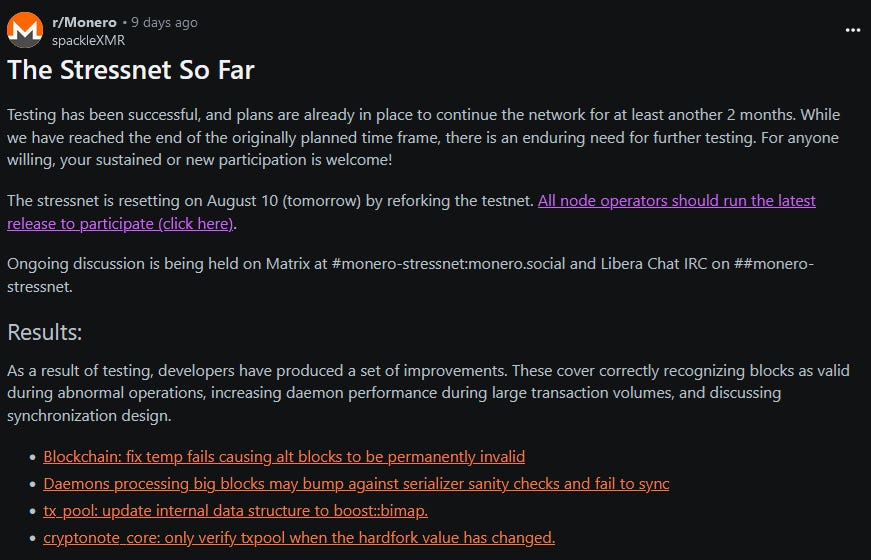






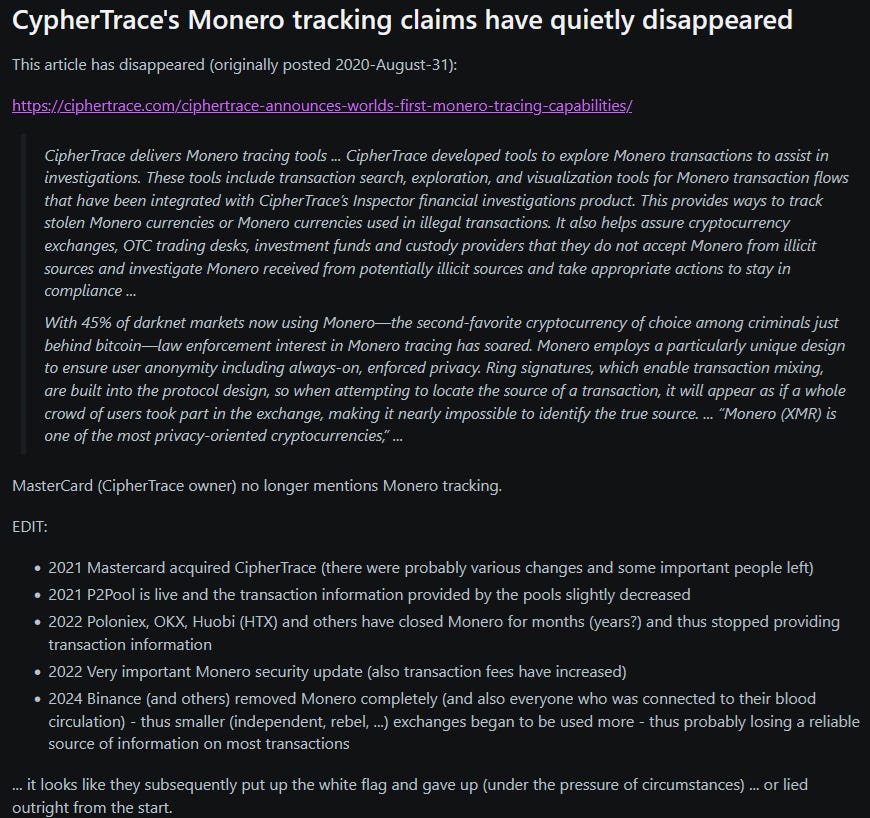







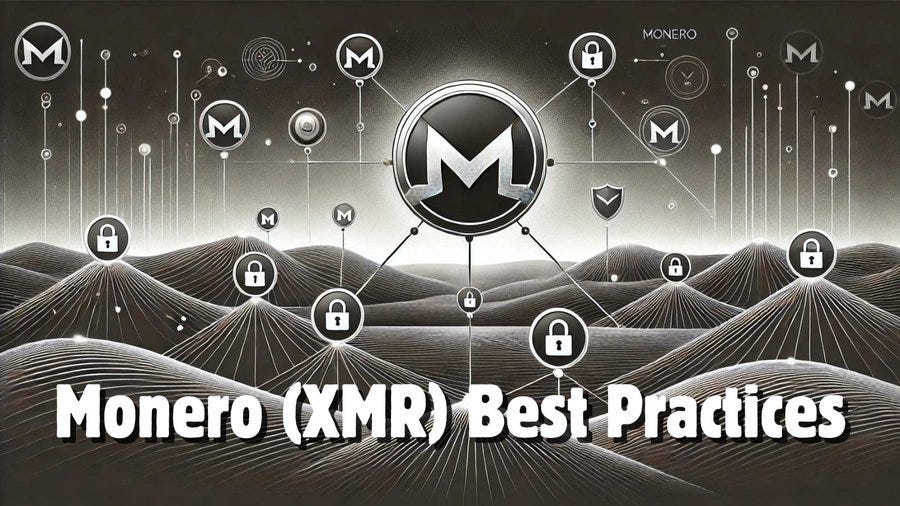

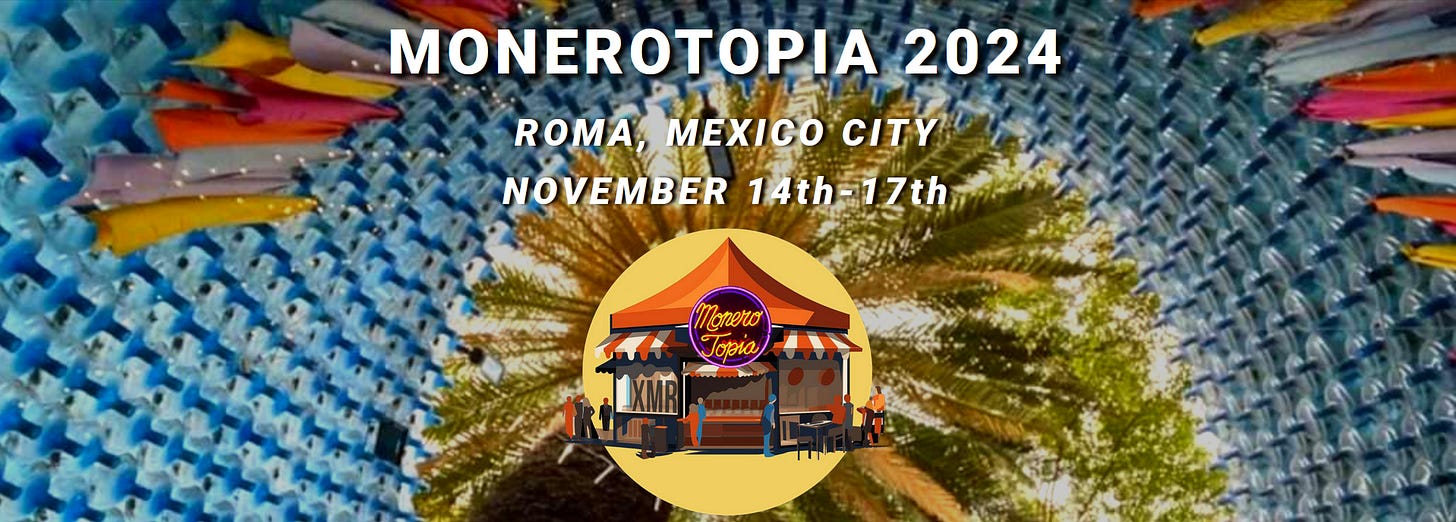












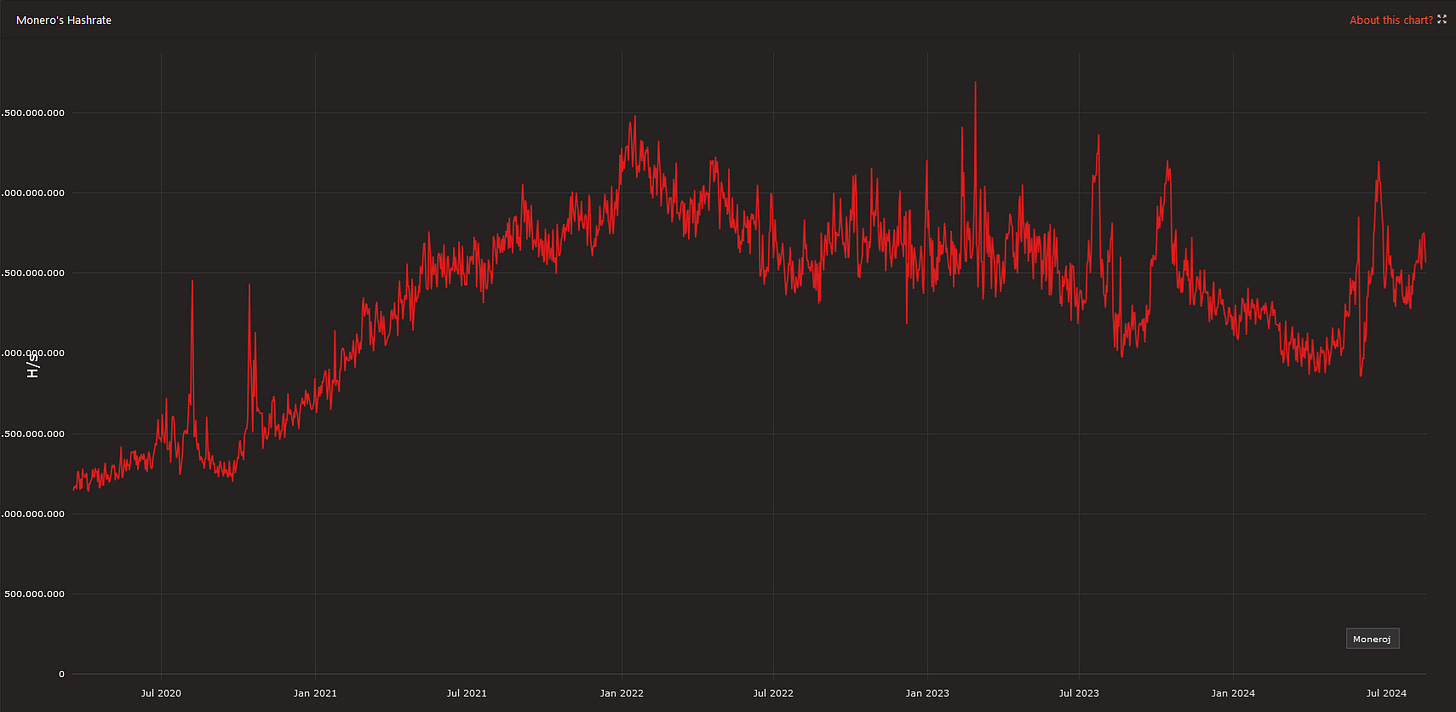


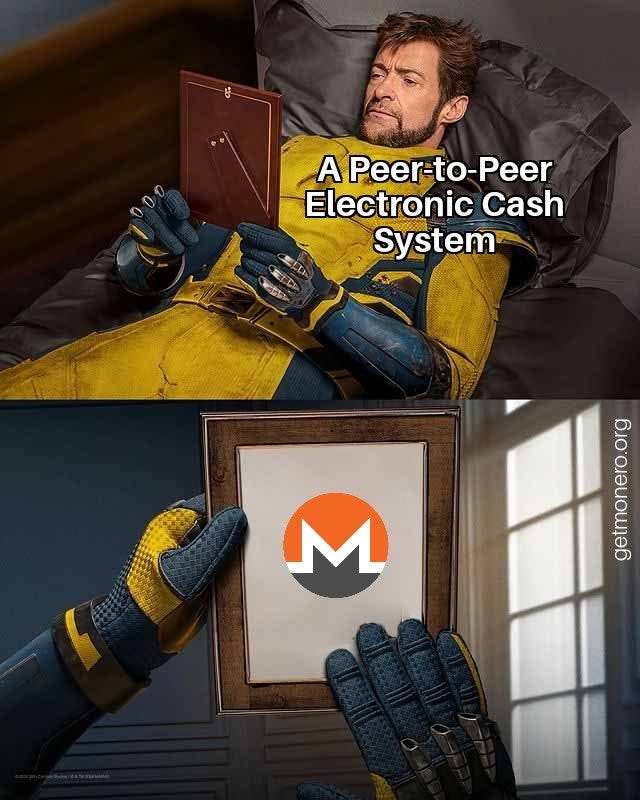



https://sunsetreptiles.com